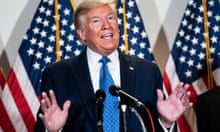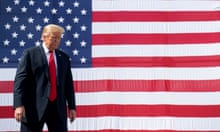Donald Trump has signalled a potential change in his handling of the coronavirus pandemic, amid warnings of a record plunge in economic activity and unemployment potentially hitting 30%, as a key Senate vote to move forward with a $1.8tn stimulus plan failed for a second time on Monday.
Democrats blocked the coronavirus rescue bill for the second day in a row, as partisan tensions erupted in extraordinary fashion on the Senate floor with lawmakers lashing out angrily over the body’s failure to pass legislation aimed at stanching the pandemic’s impact on the US economy.
“Are you kidding me?” the majority leader, Mitch McConnell, visibly frustrated, demanded from the Senate floor. “This is not a juicy political opportunity. This is a national emergency.”
Democrats say the legislation is tilted in favor of corporations and have vowed to hold it up until they secure stronger protections for workers and restrictions on how businesses will use the government money.
Senators have been working around the clock to negotiate the economic stimulus package, the largest in American history, as the virus spreads across the country, claiming hundreds of lives and wreaking havoc on the US economy. Coronavirus has already breached the Capitol, where at least two congressmen and Senator Rand Paul of Kentucky have tested positive for Covid-19, the disease caused by the virus. Congressman Ben McAdams of Utah, who tested positive last week, was hospitalized on Sunday after his condition worsened.
The extraordinary scene on Capitol Hill came as Trump expressed an openness to scaling back his efforts to combat contagion. Writing in capital letters in a tweet late on Sunday, the US president said: “We cannot let the cure be worse than the problem itself. At the end of the 15-day period” – of White House guidelines to enforce physical distancing and other measures which began on 16 March – “we will make a decision as to which way we want to go.”
Vice-President Mike Pence, who heads the White House coronavirus taskforce, said earlier in the day the federal Centers for Disease Control and Prevention (CDC) would issue guidance on Monday meant to allow people already exposed to the coronavirus to return to work sooner.
The shift in tone could foreshadow a clash between a White House alarmed by economic paralysis in an election year and public health experts urging caution. The US now has more than 39,000 confirmed cases of coronavirus and more than 400 deaths.
Dr Anthony Fauci, the most senior public health doctor on Trump’s coronavirus taskforce, is privately urging the president’s advisers and other Republicans not to roll back any restrictions, the Washington Post reported.
Fauci and other leading public health experts have told administration officials and Republican lawmakers that prematurely scaling back physical distancing measures would hamper efforts to contain the virus and devastate US hospitals, according to the people with knowledge of the conversations who, like others, spoke on the condition of anonymity to describe the private deliberations, the Post reported.
After being criticised for a slow response to the crisis, Trump declared a national emergency and agreed to implement drastic measures. But the economic pain was swift. Last week the Wall Street Journal editorial board warned that “federal and state officials need to start adjusting their anti-virus strategy now to avoid an economic recession that will dwarf the harm from 2008-2009”.
Bret Stephens, a conservative columnist at the New York Times, which Trump monitors closely, wrote on Sunday that treating the virus as a threat comparable to the second world war “needs to be questioned aggressively before we impose solutions possibly more destructive than the virus itself”.
And Tom Fitton, a conservative commentator known to influence the president, tweeted: “The consequences of this national shutdown, apart from any pandemic, are dire and will not be materially alleviated by any ‘stimulus’ and [government] spending. The only stimulus that will work is opening America back up for business.”
The change came as central bankers warned of unprecedented fallout. The St Louis Fed chief, James Bullard, said America’s GDP could shrink 50%, with unemployment rising to 30% in the second quarter. On Wall Street, Morgan Stanley saw a 30% contraction, driving unemployment to 12.8%.
The Federal Reserve said: “Aggressive efforts must be taken across the public and private sectors to limit the losses to jobs and incomes and to promote a swift recovery once the disruptions abate.”
The central bank said it was “using its full range of authorities to provide powerful support for the flow of credit to American families and businesses”.
Democrats said the $1.8tn proposals were weighted toward a corporate bailout at the expense of workers, hospitals and state and local governments. Republicans claimed Democrats were obstructing the bill in the middle of a national emergency. Both sides said they were confident a deal could still be agreed.
Trump warned that a rattled American public would take a dim view of an impasse. “The only reason a deal couldn’t get done is pure politics,” he said on Sunday.
On Monday the likely Democratic presidential nominee, Joe Biden, said Trump should “start acting like” the wartime president he has claimed to be.
The stalemate in the Senate was felt in the markets, where Dow Jones Industrial Average futures dropped more than 600 points.
In New York, which contributes close to half of the US tally, 15,168 cases, the governor, Andrew Cuomo, said an estimated 40% to 80% of residents could be infected but echoed the Trump administration’s impatience to reboot the economy.
“I take total responsibility for shutting off the economy in terms of essential workers but we also have to start to plan the pivot back to economic functionality,” Cuomo told reporters in Albany. “You can’t stop the economy forever.







